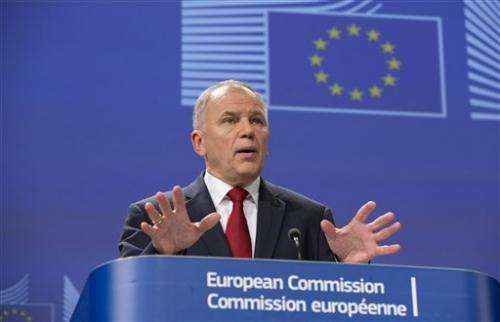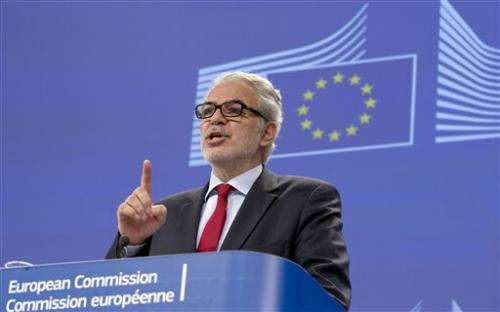European Union Commissioner for Health and Food Safety Vytenis Andriukaitis gestures while speaking during a media conference on Ebola at EU headquarters in Brussels on Tuesday, Nov. 18, 2014. The European Commission on Tuesday briefed the press on the current situation after returning from a visit to Ebola-effected countries in West Africa. (AP Photo/Virginia Mayo)
Thousands more physicians, especially epidemiologists, and other health professionals are needed to halt and eradicate Ebola, European Union officials said Tuesday after returning from countries in West Africa hit by the deadly epidemic.
EU Health Commissioner Vytenis Andriukaitis said the requirements include paramedics, nurses and health care volunteers.
"We need these people to provide treatment and also to locate Ebola victims, guide them toward clinics, train local personnel, perform contact tracing, implement awareness programs," Andriukaitis said.
He said other pressing needs include mobile laboratories, leaflets showing people how to stem the spread of the virus and thousands of portable toilets to improve sanitation and the purity of the water supply.
The trade bloc's Ebola coordinator, Christos Stylianides, said greater help is required "today, not tomorrow—it's very crucial."
The EU officials spoke to journalists after returning to Brussels from the countries most affected by Ebola: Liberia, Sierra Leone and Guinea.
Stylianides said the trip left him shaken and his immediate priority will be drafting an EU "action program." The program will specify exactly how many doctors, nurses, hygienists and other professionals are needed in West Africa, what specialties they should possess, and what training they will require.
After meeting with officials in the affected countries, Stylianides said he felt more reassured that people leaving there for Europe or other destinations will be checked for Ebola symptoms.
European Union Commissioner for Humanitarian Aid and Crisis Management Christos Stylianides gestures while speaking during a media conference on Ebola at EU headquarters in Brussels on Tuesday, Nov. 18, 2014. The European Commission on Tuesday briefed the press on the current situation after returning from a visit to Ebola-effected countries in West Africa. (AP Photo/Virginia Mayo)
"We will manage to combat the virus there, in the area where it has spread," he said. "We shouldn't allow it to escape and spread to other parts of the world."
To end the epidemic, which has claimed more than 5,000 lives in West Africa, and also prevent future outbreaks, Andriukaitis said local hygiene practices and primary health care systems must be enhanced.
© 2014 The Associated Press. All rights reserved.



















